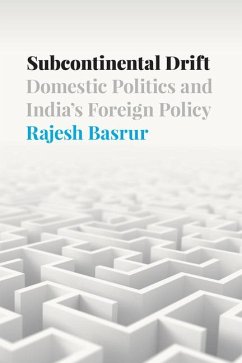"This book explains why India's foreign policy is often characterized by multiple hesitations, delays, and diversions. Rajesh Basrur finds that India's foreign policy is hampered by significant domestic political constraints, which dim the country's prospects for major power status. Basrur uses the concept of policy drift and the international relations theory known as neoclassical realism to illuminate the main types of political stumbling blocks. The four cases explored in this book demonstrate that there are two basic types of explanation for India's indecision on crucial issues. He distinguishes between involuntary drift, which is related to the distribution of domestic material power, and voluntary drift, which is produced by a responsibility deficit. Basrur's two case studies of involuntary drift, are the India-US nuclear agreement and Indian security policy toward Sri Lanka. Two other case studies on India's nuclear strategy and India's policy on cross-border terrorism demonstrate voluntary drift. Basrur concludes India's capacity to implement vital policies is under question, not only because of the specific negativities associated with the cases examined here, but more generally from what they indicate about the ability of the Indian state to surmount domestic obstacles in pursuit of its interests as a potential major power"--
Hinweis: Dieser Artikel kann nur an eine deutsche Lieferadresse ausgeliefert werden.
Hinweis: Dieser Artikel kann nur an eine deutsche Lieferadresse ausgeliefert werden.








